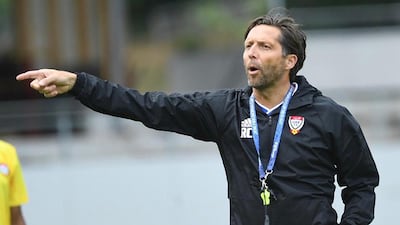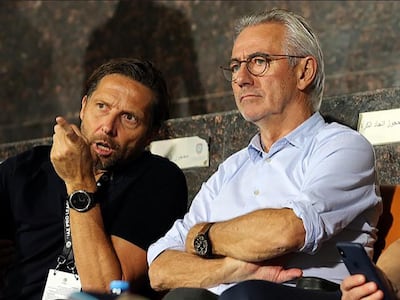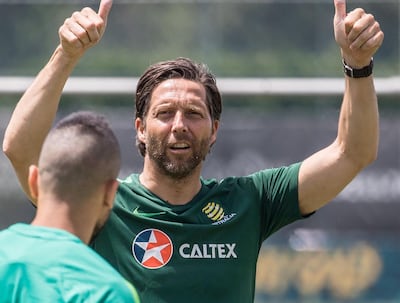Roel Coumans was assistant coach to Bert van Marwijk during the Dutchman’s spell as UAE manager last year. Van Marwijk and his staff were dismissed in December following the national team’s group-stage exit from the Gulf Cup of Nations.
When Van Marwijk left, the UAE sat fourth in Group G in the second round of qualification for the 2022 World Cup, five points off leaders Vietnam with four matches remaining, although they have a game in hand over their rivals. They are currently without a manager having dismissed Ivan Jovanovic in March without the Serbian taking charge of a match.
The National caught up with Coumans to reflect on that nine-month tenure with the UAE and to get his thoughts on the squad, the country's quest to secure a second World Cup appearance, and why the staff would like the opportunity to finish the job they started.
How saddened were you and the coaching staff when the decision was taken to dismiss you?
“Yeah, it was very disappointing. Because when you get a new team you need also a little bit of time. And when you look at the table, everything was possible to qualify. So it wasn’t necessary at that moment. But we had this Gulf Cup in between World Cup qualification and, when we conceded the fourth goal in the final minute to lose 4-2 to Qatar, we knew the FA would take a quick decision and sack us. For me, it’s a pity they didn’t take the time to wait. And you see what happened since with Jovanovic. They could have waited with us until March and then take the decision.”
How do you look back on your time with the UAE?
“It’s always a matter of do you get time or do you earn your own time as a coach. Probably we didn’t earn our own time by getting the right result at the right moment. By the way, we’re still eager to finish it with the team. And I think we’d have a good chance to succeed, because we were in a process with the players and now it’s interrupted and they have to start all over again. We have three home games and one away in Indonesia: we would’ve got enough points to qualify, for sure. If you look to the table, we are second [with that game in hand]. And Vietnam is not the strongest team in the group. I think it’s Thailand and then the UAE. So there could be a big chance to qualify.”
So you believe you would've turned around the campaign and progressed to the next round of qualification?
“For sure. Between the players and us everything was good, there was a good atmosphere, they understood how we wanted to play and players were coming back from injuries – we had a lot of injuries before. And everything is open for qualifying. I think even the head coach would be eager to finish his job. I talk a lot to him by phone - he lives in the same village. He’s always asking if there’s some news with the UAE national team. He said in the beginning that he thought they would regret the decision to sack us, because he knew we were on the right way. He’s not happy that this was his last job.”
What do you consider a success from your time with the UAE?
“Our success was the introduction of the young players, and the basics to build on. For example, people where asking why we didn’t choose Ismail Matar, who was 36 years old. When you’re losing, everyone who isn’t in the squad is the best player ever. And if you win no one is talking about it. After the first two games we won, no one was talking about the older players; everyone was talking about us building a new team, which was our task: build a new team and get results. And these young players were developing. Maybe we had too many at the beginning, but that’s something I’m proud of: that we gave young players a chance and they can develop. And they’re still grateful. Sometimes I talk to [Al Wahda goalkeeper Mohammed] Al Shamsi and every time he says ‘I’m very thankful that you gave me the chance to be the No 1 at the Gulf Cup because it was a great experience for me’. And in the future, he’ll be one of the best goalkeepers in the Gulf region, without doubt.”
What other young players impressed you?
“Abdullah Ramadan, Ali Saleh. And Ali Salmeen, although he’s 26. He can be one of the players for the future, kind of a central brick in the house. He’s a player you need in there who keeps everything together, who plays with the right mentality in midfield, with good decision-making and keeping the ball. He’s not the most talented player in the squad - not the Omar Abdulrahman - but he’s very, very valuable. And Harib Abdallah, the left-winger at Shabab Al Ahli, who’s only 17. He’s a player for the future, although we didn’t have him in the squad; it’s only what I’ve seen from the club games and the training sessions.”
Ali Mabkhout became the UAE’s all-time leading scorer during your time there and scored six goals in three qualifiers. What makes him so good?
“Ali is a phenomenon. In the box, he’s incredible. I never saw a player like him. If he was playing in Europe, and playing in the right team, for sure he will score goals. Look at his statistics: they’re well above average. Last March, when we were starting out, Van Marwijk asked about Mabkhout and I said he’s a predator. Sometimes he’s not doing anything, but when he gets the right moment, the right ball, he finishes. It’s unbelievable. When you see him you think he’s not focused, but he’s putting effort only when he feels a chance to score. And when the rest of the team understands this, then you get balance in your team. In the UAE they understand this is a very, very good weapon for them.”
What about Omar Abdulrahman? He was coming back from a yearlong injury sustained with Al Hilal in 2018 and understandably had to be eased back into action.
“Omar got injured in October the year before. I visited him when he was at Hilal, at a training camp in Austria in July, to see how he was, and then we decided to take him in the squad for that first qualifier in September. He had a camp in Bahrain and played his first minutes there. You saw that he misses a little, but also that he’s a quality player. His vision and his technical skills are extremely high. But if you’re nine months out and with this injury, you need almost the same period to get back on your level. You see in the league with Al Jazira, Omar was doing better and better, but still not at his best. In this period, from now until the qualifiers start again in October, if he trains well, you will see him back on his true level. With us, our only disappointment was that he wanted to play more, when he wasn't yet ready. But he will get better and better, and be a big part of qualification.”
What do you think the UAE need to do to ensure they qualify for the next round?
“Even if they have only six points, they still have three matches at home, and have to go to Indonesia, who are the worst team in the group. I think they will qualify if they do the right things: believe you can force your own luck, that by working hard you can create it, and play in the structure, which with us was much better than before. In the beginning it doesn’t look very attractive, but you have to build a control, control without the ball, or even when you have 10 players, like we had for almost 60 minutes against Vietnam. They need structure and strategy, physically fit players and discipline, and then they will qualify. I’m sure they will make it.”
Since you’ve left, three players have been given UAE citizenship and are now eligible for the national team: Sebastian Tagliabue, Caio and Fabio De Lima. How big an advantage will that be going forward?
“At the time we had only Ali scoring for us, so when this team has a little bit more variation in scoring ability they will be stronger. With Sebastian, even though he’s 35, you have a player who can score goals, so that will help a lot. De Lima and Caio also can score. These players will give you this extra competition in the group so that other players will develop more and quicker. In the other way, I’m interested to see what happens, because it can also work negatively if three Emirati players are playing well and you leave them out of the squad for three foreign-born players; I don’t know if this is constructive for your team. How will they deal with it? How will the squad? But they need goals. I wish we had them when we were there.”
You, Bert and the staff have experience of guiding a Gulf country to a World Cup, with Saudi Arabia in 2018. Do you think the UAE have the talent to emulate that?
“They had what they considered the best squad ever from 2010 and even they didn’t make it in 2014 and 2018. So that shows already that it’s very difficult to qualify. And if you’re looking to the countries in Asia and you’re realistic, the UAE probably rank about sixth-best at the moment, when they’re playing well. You’ve got Japan, Saudi Arabia, South Korea, Iran, Qatar at the minute. And Thailand are currently doing better. But sometimes not the best players or best team will go to the World Cup. If you create a good team - like we've seen with Saudi Arabia, because they also said this wasn’t the best generation and wouldn’t qualify - create a good environment to develop, and if they really believe they can qualify, they will. If they are not fit, don’t have the right mentality, the right vision as a football nation – and by that I mean that you understand that developing the team is a process and not only about results – then they won’t have a chance. Consistently at every level is needed. But, for sure, it will be difficult.”
You haven’t been involved with a team since leaving the UAE. What are your plans for the future?
“I always say I had seven years’ master-class with a top coach. I see Van Marwijk really as a top coach; I learned a lot from him. But it’s time for me to go on my own as a head coach. I prefer to be in the Gulf region, to start in the UAE or Saudi Arabia, and had some interest in Saudi Arabia and also Egypt, but then the coronavirus came and everything was back to zero. But that’s my goal. People say ‘Yeah but you weren’t a head coach’, but that’s wrong: I managed Under-19s, U23s, was in a third-division club in my hometown. What do you prefer, an assistant coach who was at world-class level, who was at the World Cup in Russia with Australia, or a head coach who was in a lower league? I’m still developing myself and am confident I will get a job, but it’s also about the ambition of a club to match my ambitions. I just need a chance to show that I’m ready.”




